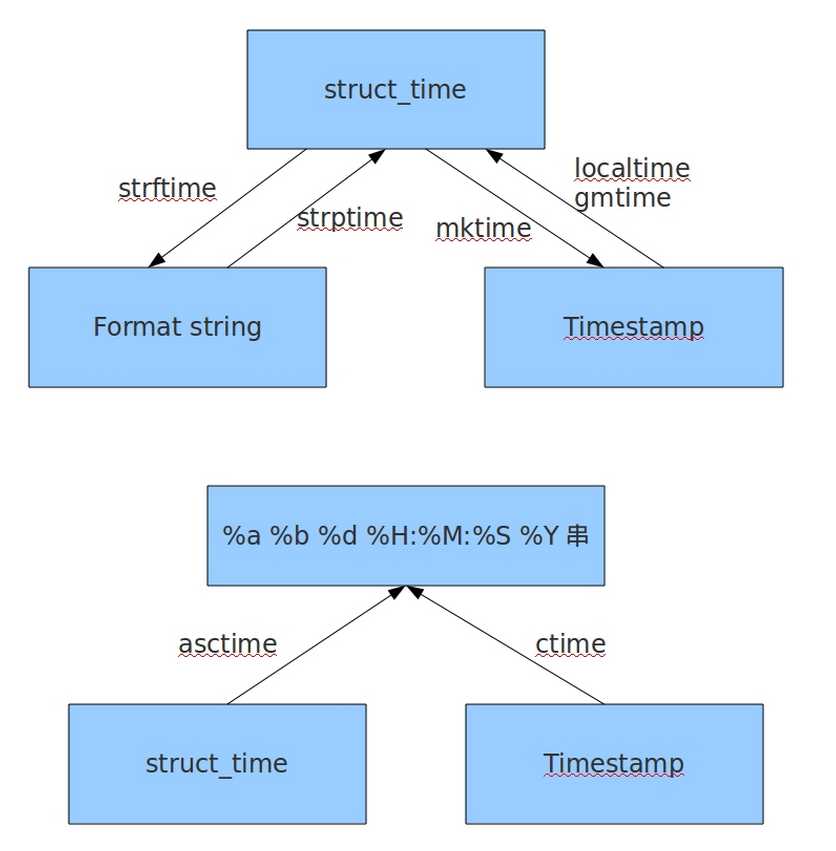标签:时间表 border oca 时间格式 time 固定 one tms 返回
time模块中时间表现的格式主要有三种:
a、timestamp时间戳,时间戳表示的是从1970年1月1日00:00:00开始按秒计算的偏移量
b、struct_time时间元组,共有九个元素组。
c、format time 格式化时间,已格式化的结构使时间更具可读性。包括自定义格式和固定格式。
1、时间格式转换图:

2、主要time生成方法和time格式转换方法实例:
1 import time 2 3 #【生成timestamp时间戳】 4 print(time.time()) 5 print(time.mktime(time.localtime())) #struct_time to timestamp 6 print(‘-‘*20) 7 8 # 【生成struct_time时间元组】 9 # timestamp to struct_time 【本地时间】 10 print(time.localtime()) 11 print(time.localtime(time.time())) 12 print(‘-‘*20) 13 # timestamp to struct_time 【格林威治时间】 14 print(time.gmtime()) 15 print(time.gmtime(time.time())) 16 print(‘-‘*20) 17 #format_time(格式化时间) to struct_time(时间元组) 18 print(time.strptime(‘2014-11-11‘, ‘%Y-%m-%d‘)) 19 print(time.strptime(‘2011-05-05 16:37:06‘, ‘%Y-%m-%d %X‘)) 20 print(‘-‘*20)
struct_time元组元素结构
属性 值 tm_year(年) 比如2011 tm_mon(月) 1 - 12 tm_mday(日) 1 - 31 tm_hour(时) 0 - 23 tm_min(分) 0 - 59 tm_sec(秒) 0 - 61 tm_wday(weekday) 0 - 6(0表示周日) tm_yday(一年中的第几天) 1 - 366 tm_isdst(是否是夏令时) 默认为-1
format time结构化表示
| 格式 | 含义 |
| %a | 本地(locale)简化星期名称 |
| %A | 本地完整星期名称 |
| %b | 本地简化月份名称 |
| %B | 本地完整月份名称 |
| %c | 本地相应的日期和时间表示 |
| %d | 一个月中的第几天(01 - 31) |
| %H | 一天中的第几个小时(24小时制,00 - 23) |
| %I | 第几个小时(12小时制,01 - 12) |
| %j | 一年中的第几天(001 - 366) |
| %m | 月份(01 - 12) |
| %M | 分钟数(00 - 59) |
| %p | 本地am或者pm的相应符 |
| %S | 秒(01 - 61) |
| %U | 一年中的星期数。(00 - 53星期天是一个星期的开始。)第一个星期天之前的所有天数都放在第0周。 |
| %w | 一个星期中的第几天(0 - 6,0是星期天) |
| %W | 和%U基本相同,不同的是%W以星期一为一个星期的开始。 |
| %x | 本地相应日期 |
| %X | 本地相应时间 |
| %y | 去掉世纪的年份(00 - 99) |
| %Y | 完整的年份 |
| %Z | 时区的名字(如果不存在为空字符) |
| %% | ‘%’字符 |
常见结构化时间组合:
print time.strftime("%Y-%m-%d %X") #2018-9-5 14:50:13
3、time加减
1 #timestamp加减单位以秒为单位 2 import time 3 t1 = time.time() 4 t2=t1+10 5 6 print time.ctime(t1)#Wed Oct 26 21:15:30 2018 7 print time.ctime(t2)
datatime模块重新封装了time模块,提供更多接口,提供的类有:date,time,datetime,timedelta,tzinfo。
1、date类
1 from datetime import * 2 import time 3 # 【静态方法和字段】 4 print(date.max) #对象所能表示的最大、最小日期 5 print(date.min) 6 print(date.resolution)#对象表示日期的最小单位。这里是天 7 print(date.today()) #返回一个表示当前本地日期的date对象 8 print(date.fromtimestamp(time.time())) #根据给定的时间戮,返回一个date对象; 9 10 # 【方法和属性】 11 now = date(2018, 9, 5) 12 tomorrow = now.replace(day = 27) 13 14 print(now.replace(2012,8,8)) #生成一个新的日期对象,用参数指定的年,月,日代替原有对象中的属性。 15 print(now,tomorrow) 16 print(‘-‘*20) 17 18 print(now.timetuple()) #返回日期对应的time.struct_time对象; 19 print(‘-‘*20) 20 21 print(now.weekday()) #返回weekday,如果是星期一,返回0;如果是星期2,返回1,以此类推; 22 print(now.isoweekday()) #返回weekday,如果是星期一,返回1;如果是星期2,返回2,以此类推; 23 print(‘-‘*20) 24 25 print(now.isocalendar()) #返回格式如(year,month,day)的元组; 26 print(now.isoformat()) #返回格式如‘YYYY-MM-DD’的字符串; 27 print(now.strftime("%Y-%m-%d"))
2、time类
1 from datetime import * 2 tm = time(23,46,10) 3 print(tm) 4 print(‘hour: %d, minute: %d, second: %d, microsecond: %d‘ % (tm.hour, tm.minute, tm.second, tm.microsecond)) 5 tm1 = tm.replace(hour=20) 6 print(‘tm1:‘, tm1) 7 print(‘isoformat:‘, tm.isoformat()) 8 print(‘strftime‘, tm.strftime("%X"))
3、datetime类
1 # 静态方法和字段 2 from datetime import * 3 import time 4 5 print(‘datetime.max:‘, datetime.max) 6 print(‘datetime.min:‘, datetime.min) 7 print(‘datetime.resolution:‘, datetime.resolution) 8 print(‘-‘*20) 9 print(‘today():‘, datetime.today()) 10 print(‘now():‘, datetime.now()) 11 print(‘utcnow():‘, datetime.utcnow()) 12 print(‘-‘*20) 13 print(‘fromtimestamp(tmstmp):‘, datetime.fromtimestamp(time.time())) 14 print(‘utcfromtimestamp(tmstmp):‘, datetime.utcfromtimestamp(time.time())) 15 16 # 方法和属性 17 dt=datetime.now()#datetime对象 18 print(dt.date()) 19 print(dt.time()) 20 print(dt.replace()) 21 print(‘-‘*20) 22 print(dt.timetuple()) 23 print(dt.utctimetuple()) 24 print(‘-‘*20) 25 print(dt.toordinal()) 26 print(dt.weekday()) 27 print(‘-‘*20) 28 print(dt.isocalendar()) 29 print(dt.ctime()) 30 print(dt.strftime)
4.timedelta类,时间加减
1 from datetime import * 2 3 dt = datetime.now() 4 5 dt1 = dt + timedelta(days=-1)#昨天 6 dt2 = dt - timedelta(days=1)#昨天 7 dt3 = dt + timedelta(days=1)#明天 8 delta_obj = dt3-dt1 9 10 print(type(delta_obj),delta_obj) 11 print(delta_obj.days,delta_obj.total_seconds())
5、tzinfo时区类
1 from datetime import datetime, tzinfo,timedelta 2 3 """ 4 tzinfo是关于时区信息的类 5 tzinfo是一个抽象类,所以不能直接被实例化 6 """ 7 class UTC(tzinfo): 8 def __init__(self,offset = 0): 9 self._offset = offset 10 11 def utcoffset(self, dt): 12 return timedelta(hours=self._offset) 13 14 def tzname(self, dt): 15 return "UTC +%s" % self._offset 16 17 def dst(self, dt): 18 return timedelta(hours=self._offset) 19 20 #北京时间 21 beijing = datetime(2011,11,11,0,0,0,tzinfo = UTC(8)) 22 print ("beijing time:",beijing) 23 #曼谷时间 24 bangkok = datetime(2011,11,11,0,0,0,tzinfo = UTC(7)) 25 print ("bangkok time",bangkok) 26 #北京时间转成曼谷时间 27 print ("beijing-time to bangkok-time:",beijing.astimezone(UTC(7))) 28 29 #计算时间差时也会考虑时区的问题 30 timespan = beijing - bangkok 31 print ("时差:",timespan)
【python】 time模块和datetime模块详解 【转】
标签:时间表 border oca 时间格式 time 固定 one tms 返回
原文地址:https://www.cnblogs.com/louis-w/p/9591747.html